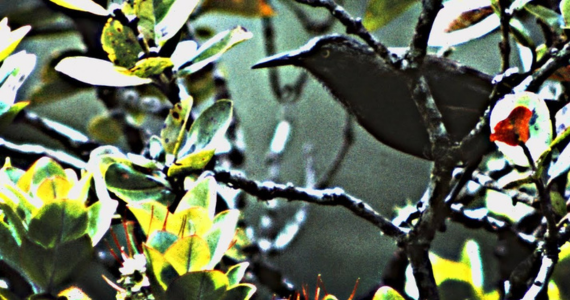Climate Change Meets Public Health Meets Music
Posted on
March 31, 2023
 The Kauaʻi ʻōʻō bird, a now-extinct species of small honeyeater, was last seen in Hawaii in 1987.
The Kauaʻi ʻōʻō bird, a now-extinct species of small honeyeater, was last seen in Hawaii in 1987.
By Dean Ana V. Diez Roux, MD, PhD, MPH
Sometimes things come together in ways that are unexpected and yet remarkably natural. This happened to me this weekend when I went to hear the Philadelphia Orchestra play Vespers of the Blessed Earth, a new work by the U.S. composer John Luther Adams.
These past few weeks our SALURBAL (Salud Urbana en America Latina/Urban Health in Latin America) team has been intensely focused on developing the ideas for what we hope will be the next phase of SALURBAL. We know we will focus on generating knowledge on the impacts of climate change on health in cities of the region, and on how this knowledge can be used. We have had many meetings over Zoom but also thankfully, and most recently, in person: last week the full team met in Mexico City for the first time since the pandemic.
Over several days, in the beautiful Casa de California in Mexico City, we reviewed our progress over the past 6 years, reflected on lessons learned, and talked about our hopes for the future. We have many hopes and ambitions: our theme is after all “making the impossible possible”…. We want to continue to build the remarkable pan-Latinamerican collaboration that we have constructed, a collaboration that aspires to include everyone in a meaningful way, to generate rigorous evidence on what drives health, but perhaps most importantly, a collaboration that wants to create real change in our countries and cities for health and for equity.
Our theme for this next phase is the impact of climate change on health. But we want to go beyond just describing and documenting impacts (after all do we really need more evidence that climate change is affecting us and threatening our future?), we want to make starkly visible what we know, we want to create a sense of urgency, we want to empower communities and the public to demand and spur change. We hope a focus on health will help us do this.
We know this won’t be easy because the underlying drivers of climate change are rooted in our economic system, in what we consume and how, and in how we organize our society. But this is no excuse to throw up our hands in abandon. Because there are also steps we can take right now: we can reduce car use, make our cities greener, and promote the use of cleaner forms of energy. As is always the case in public health we have to be at once pragmatic and in some ways small-minded (acting on what we can do here and now), but at the same time keep in mind the big picture, the fundamental and urgent need to act directly on the systemic drivers. I am a firm believer that through our evidence we can contribute to systemic change too, but that change requires political movements and social action that goes well beyond our role as scientist or public health practitioner.
Adam’s piece for choir and small orchestra is structured in five movements. In the first one “A Brief Descent Into Deep Time” the choir reminisces on 2 billion years of earth history reciting the names, colors and ages of the geologic layers of the Grand Canyon. In the second movement “A Weeping of Doves” the choir sings a cappella, imitating the strange and beautiful call of a dove from the rainforests of Paula New Guinea. The third movement “Night Shining Clouds” is somber and almost trance-like, the strings taking us down, down into the depths of what we are doing to our planet. In “Litanies of the Sixth Extinction,” the fourth movement, the choir sings the scientific names of 193 threatened and endangered earth species, ending ominously with homo sapiens. And in the last and in my view most beautiful movement a soprano sings “Aria of the Ghost Bird," which recalls the call of the now extinct Kauaʻi ʻōʻō bird, a hauntingly moving piece.
At Kimmel Hall the orchestra was set up with the winds standing on the balconies above and behind us rather than on the stage. This added to the sense of being surrounded and immersed in the music. Perhaps it was this, or perhaps the music itself, or perhaps that I had been writing all day about climate change and health, that gave me the realization that everything was in the end connected. Or perhaps it was the beautiful quote by composer Adams in the program:
“No matter what we humans may vaingloriously believe, ours is not to “save the planet.” With or without us, the earth will endure. The urgent challenge now facing humanity is to save ourselves, to become more fully and deeply human.”
Ourselves, our health, our humanity, a more moving and more truthful call to action, I have not seen.